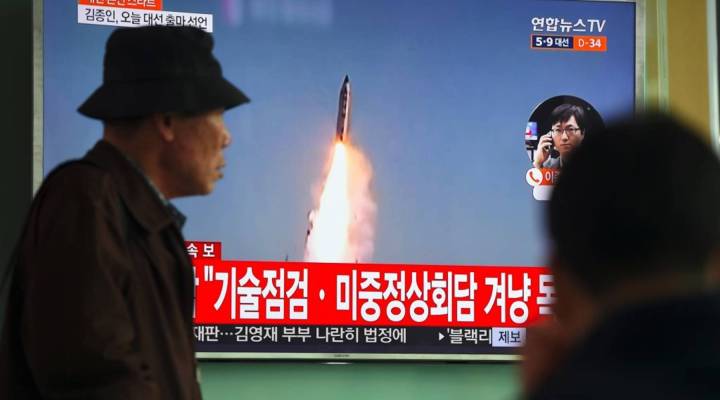
The U.S. and North Korea may be in a rare position to negotiate
The U.S. and North Korea may be in a rare position to negotiate

With the presidents of China and the U.S. meeting in Florida starting today, it’s trade and North Korea likely at the top of the agenda. And one expert on North Korea’s relations has noted some signs in the last year or so that President Trump might like to put his “Art of the Deal” negotiating skills to work on fixing the North Korea situation.
We spoke with Leon Sigal, director of the Northeast Asia Cooperative Security Project at the Social Science Research Council in New York. Below is an edited transcript of their conversation.
David Brancaccio: You parsed some of his campaign speeches, you saw, if you’re really looking carefully as you were, there are places where as a candidate, Donald Trump thought maybe he could do some talking with these people. But since then, the assassination with nerve gas in Kuala Lumpur and North Korea firing more missiles may have changed his or his administration’s impulse to negotiate.
Leon Sigal: Well, actually, he came close to starting negotiations, the question is: can he get back there? And he did so after the test of the KN-11, the [missile] they just tested. And that’s where his dealings with President Xi of China might be useful. The Chinese are prepared to help us if we’re interested in negotiation. If it’s not about negotiating, there’s very little the Chinese can do to put enough pressure on North Korea to make them knuckle under.
- RELATED: China bets big on border town with Russia, North Korea
- President Trump prepares for ‘difficult’ talks with China’s Xi Jinping
Brancaccio: It’s interesting because that’s not the administration’s public view. The administration, Donald Trump in particular, seems to think that the Chinese could lean heavily on North Korea if they so desire.
Sigal: They don’t desire it. Forcing North Korea to knuckle under would require a cutoff of oil, a cutoff of food, a cutoff of purchases. And that’s something the Chinese are not willing to risk, because the consequences of instability on their border are grave. What people may not know is the North Koreans have shown some interest in suspending their nuclear and missile programs in return for the U.S. addressing their security concerns. North Korea wants to reduce its dependence on China. That’s why it wants to talk to Washington.
Brancaccio: One of the reasons it’s just so confounding, right — there may have been this impulse by this new president to do some talking, yet the North Koreans do stuff that can lower the chances of talking.
Sigal: That’s right. Part of is that they don’t really trust us to carry out our ends of the deals. And there is some history here. And that makes it very hard politically to deal with them in Washington. The interesting thing about Donald Trump is he doesn’t buy the usual foreign policy establishment views of things. And he just might be willing to try to negotiate.
There’s a lot happening in the world. Through it all, Marketplace is here for you.
You rely on Marketplace to break down the world’s events and tell you how it affects you in a fact-based, approachable way. We rely on your financial support to keep making that possible.
Your donation today powers the independent journalism that you rely on. For just $5/month, you can help sustain Marketplace so we can keep reporting on the things that matter to you.












